×
Il semble que vous utilisiez une version obsolète de internet explorer. Internet explorer n'est plus supporté par Microsoft depuis fin 2015. Nous vous invitons à utiliser un navigateur plus récent tel que Firefox, Google Chrome ou Microsoft Edge.

Devenez membre d'Incathlab et bénéficiez d'un accès complet !
Vous devez être membre pour accéder aux vidéos Incathlab sans limitation. Inscrivez vous gratuitement en moins d'une minute et accédez à tous les services Incathlab ! Vous avez aussi la possibilité de vous connecter directement avec votre compte facebook ou twitter en cliquant sur login en haut à droite du site.
Inscription Connexion
Inscription Connexion
15909 vues
Program
| 11:00 |
Compare and discuss the different cardiac department organizations across Europe to face COVID-19 pandemic
Italy - Gabriele GaspariniSpain – Javier Escaned France – Thierry Lefèvre Germany – Kambis Mashayekhi Q&A session |
| 11:30 |
How to prepare your cathlab “structure” for the management of COVID-19 patients
Javier Escaned
Q&A session How to protect your team-yourself-the patient, and when to use personal protective equipment (PPE) Gabriele Gasparini Q&A session
Video tutorial on how to protect yourself: https://www.dctv.unipd.it/tutorialcovid
|
| 12:00 |
How to deal with acute coronary syndrome patients during the COVID-19 pandemia
Pathway for STEMI patients
Kambis Mashayekhi
Q&A session
Pathway for NON STEMI patients
Kambis Mashayekhi
Q&A session |
| 12:45 |
Is there a place for SH interventions during the pandemia?
Open discussion Q&A session |
| 13:00 |
Changing mindsets for interventional cardiology & Management of delayed patients
Thierry Lefèvre Q&A session |
Date du tournage : 28/03/2020
Dernière mise à jour : 23/06/2021
Dernière mise à jour : 23/06/2021
Participer à la discussion
Suggestions
Mercredi 5 juillet 2023 de 18h à 19h (GMT+2)
Honolulu : Mercredi 5 juillet 2023 de 07h à 08h (GMT+2)
San Francisco : Mercredi 5 juillet 2023 de 10h à 11h (GMT+2)
New York : Mercredi 5 juillet 2023 de 13h à 14h (GMT+2)
Buenos Aires : Mercredi 5 juillet 2023 de 14h à 15h (GMT+2)
Reykjavik : Mercredi 5 juillet 2023 de 17h à 18h (GMT+2)
London / Dublin : Mercredi 5 juillet 2023 de 18h à 19h (GMT+2)
Paris / Berlin : Mercredi 5 juillet 2023 de 19h à 20h (GMT+2)
Istanbul : Mercredi 5 juillet 2023 de 20h à 21h (GMT+2)
Moscou / Dubaï : Mercredi 5 juillet 2023 de 21h à 22h (GMT+2)
Bangkok : Jeudi 6 juillet 2023 de 00h à 01h (GMT+2)
Shanghai : Jeudi 6 juillet 2023 de 01h à 02h (GMT+2)
Tokyo : Jeudi 6 juillet 2023 de 02h à 03h (GMT+2)
Sydney : Jeudi 6 juillet 2023 de 04h à 05h (GMT+2)
Wellington : Jeudi 6 juillet 2023 de 06h à 07h (GMT+2)
San Francisco : Mercredi 5 juillet 2023 de 10h à 11h (GMT+2)
New York : Mercredi 5 juillet 2023 de 13h à 14h (GMT+2)
Buenos Aires : Mercredi 5 juillet 2023 de 14h à 15h (GMT+2)
Reykjavik : Mercredi 5 juillet 2023 de 17h à 18h (GMT+2)
London / Dublin : Mercredi 5 juillet 2023 de 18h à 19h (GMT+2)
Paris / Berlin : Mercredi 5 juillet 2023 de 19h à 20h (GMT+2)
Istanbul : Mercredi 5 juillet 2023 de 20h à 21h (GMT+2)
Moscou / Dubaï : Mercredi 5 juillet 2023 de 21h à 22h (GMT+2)
Bangkok : Jeudi 6 juillet 2023 de 00h à 01h (GMT+2)
Shanghai : Jeudi 6 juillet 2023 de 01h à 02h (GMT+2)
Tokyo : Jeudi 6 juillet 2023 de 02h à 03h (GMT+2)
Sydney : Jeudi 6 juillet 2023 de 04h à 05h (GMT+2)
Wellington : Jeudi 6 juillet 2023 de 06h à 07h (GMT+2)
Left Main and Bifurcation treatment:
impact of clinical trials in daily practice
Partager
Mercredi 4 octobre 2023 de 18h à 18h45 (GMT+2)
Honolulu : Mercredi 4 octobre 2023 de 07h à 07h45 (GMT+2)
San Francisco : Mercredi 4 octobre 2023 de 10h à 10h45 (GMT+2)
New York : Mercredi 4 octobre 2023 de 13h à 13h45 (GMT+2)
Buenos Aires : Mercredi 4 octobre 2023 de 14h à 14h45 (GMT+2)
Reykjavik : Mercredi 4 octobre 2023 de 17h à 17h45 (GMT+2)
London / Dublin : Mercredi 4 octobre 2023 de 18h à 18h45 (GMT+2)
Paris / Berlin : Mercredi 4 octobre 2023 de 19h à 19h45 (GMT+2)
Istanbul : Mercredi 4 octobre 2023 de 20h à 20h45 (GMT+2)
Moscou / Dubaï : Mercredi 4 octobre 2023 de 21h à 21h45 (GMT+2)
Bangkok : Jeudi 5 octobre 2023 de 00h à 00h45 (GMT+2)
Shanghai : Jeudi 5 octobre 2023 de 01h à 01h45 (GMT+2)
Tokyo : Jeudi 5 octobre 2023 de 02h à 02h45 (GMT+2)
Sydney : Jeudi 5 octobre 2023 de 04h à 04h45 (GMT+2)
Wellington : Jeudi 5 octobre 2023 de 06h à 06h45 (GMT+2)
San Francisco : Mercredi 4 octobre 2023 de 10h à 10h45 (GMT+2)
New York : Mercredi 4 octobre 2023 de 13h à 13h45 (GMT+2)
Buenos Aires : Mercredi 4 octobre 2023 de 14h à 14h45 (GMT+2)
Reykjavik : Mercredi 4 octobre 2023 de 17h à 17h45 (GMT+2)
London / Dublin : Mercredi 4 octobre 2023 de 18h à 18h45 (GMT+2)
Paris / Berlin : Mercredi 4 octobre 2023 de 19h à 19h45 (GMT+2)
Istanbul : Mercredi 4 octobre 2023 de 20h à 20h45 (GMT+2)
Moscou / Dubaï : Mercredi 4 octobre 2023 de 21h à 21h45 (GMT+2)
Bangkok : Jeudi 5 octobre 2023 de 00h à 00h45 (GMT+2)
Shanghai : Jeudi 5 octobre 2023 de 01h à 01h45 (GMT+2)
Tokyo : Jeudi 5 octobre 2023 de 02h à 02h45 (GMT+2)
Sydney : Jeudi 5 octobre 2023 de 04h à 04h45 (GMT+2)
Wellington : Jeudi 5 octobre 2023 de 06h à 06h45 (GMT+2)
Guides de 1ère intention :
algorithme décisionnel de la lésion simple à la lésion complexe
Partager
Mercredi 18 septembre 2024 de 12h à 13h (GMT+2)
Honolulu : Mercredi 18 septembre 2024 de 01h à 02h (GMT+2)
San Francisco : Mercredi 18 septembre 2024 de 04h à 05h (GMT+2)
New York : Mercredi 18 septembre 2024 de 07h à 08h (GMT+2)
Buenos Aires : Mercredi 18 septembre 2024 de 08h à 09h (GMT+2)
Reykjavik : Mercredi 18 septembre 2024 de 11h à 12h (GMT+2)
London / Dublin : Mercredi 18 septembre 2024 de 12h à 13h (GMT+2)
Paris / Berlin : Mercredi 18 septembre 2024 de 13h à 14h (GMT+2)
Istanbul : Mercredi 18 septembre 2024 de 14h à 15h (GMT+2)
Moscou / Dubaï : Mercredi 18 septembre 2024 de 15h à 16h (GMT+2)
Bangkok : Mercredi 18 septembre 2024 de 18h à 19h (GMT+2)
Shanghai : Mercredi 18 septembre 2024 de 19h à 20h (GMT+2)
Tokyo : Mercredi 18 septembre 2024 de 20h à 21h (GMT+2)
Sydney : Mercredi 18 septembre 2024 de 22h à 23h (GMT+2)
Wellington : Jeudi 19 septembre 2024 de 00h à 01h (GMT+2)
San Francisco : Mercredi 18 septembre 2024 de 04h à 05h (GMT+2)
New York : Mercredi 18 septembre 2024 de 07h à 08h (GMT+2)
Buenos Aires : Mercredi 18 septembre 2024 de 08h à 09h (GMT+2)
Reykjavik : Mercredi 18 septembre 2024 de 11h à 12h (GMT+2)
London / Dublin : Mercredi 18 septembre 2024 de 12h à 13h (GMT+2)
Paris / Berlin : Mercredi 18 septembre 2024 de 13h à 14h (GMT+2)
Istanbul : Mercredi 18 septembre 2024 de 14h à 15h (GMT+2)
Moscou / Dubaï : Mercredi 18 septembre 2024 de 15h à 16h (GMT+2)
Bangkok : Mercredi 18 septembre 2024 de 18h à 19h (GMT+2)
Shanghai : Mercredi 18 septembre 2024 de 19h à 20h (GMT+2)
Tokyo : Mercredi 18 septembre 2024 de 20h à 21h (GMT+2)
Sydney : Mercredi 18 septembre 2024 de 22h à 23h (GMT+2)
Wellington : Jeudi 19 septembre 2024 de 00h à 01h (GMT+2)
Can PCI outcomes get any better?
Advancing the standard of care with bioadaptor
Partager
Vendredi 23 septembre 2022 de 08h30 à 16h10 (GMT+2)
Honolulu : Jeudi 22 septembre 2022 de 21h30 à 05h10 (GMT+2)
San Francisco : Vendredi 23 septembre 2022 de 00h30 à 08h10 (GMT+2)
New York : Vendredi 23 septembre 2022 de 03h30 à 11h10 (GMT+2)
Buenos Aires : Vendredi 23 septembre 2022 de 04h30 à 12h10 (GMT+2)
Reykjavik : Vendredi 23 septembre 2022 de 07h30 à 15h10 (GMT+2)
London / Dublin : Vendredi 23 septembre 2022 de 08h30 à 16h10 (GMT+2)
Paris / Berlin : Vendredi 23 septembre 2022 de 09h30 à 17h10 (GMT+2)
Istanbul : Vendredi 23 septembre 2022 de 10h30 à 18h10 (GMT+2)
Moscou / Dubaï : Vendredi 23 septembre 2022 de 11h30 à 19h10 (GMT+2)
Bangkok : Vendredi 23 septembre 2022 de 14h30 à 22h10 (GMT+2)
Shanghai : Vendredi 23 septembre 2022 de 15h30 à 23h10 (GMT+2)
Tokyo : Vendredi 23 septembre 2022 de 16h30 à 00h10 (GMT+2)
Sydney : Vendredi 23 septembre 2022 de 18h30 à 02h10 (GMT+2)
Wellington : Vendredi 23 septembre 2022 de 20h30 à 04h10 (GMT+2)
San Francisco : Vendredi 23 septembre 2022 de 00h30 à 08h10 (GMT+2)
New York : Vendredi 23 septembre 2022 de 03h30 à 11h10 (GMT+2)
Buenos Aires : Vendredi 23 septembre 2022 de 04h30 à 12h10 (GMT+2)
Reykjavik : Vendredi 23 septembre 2022 de 07h30 à 15h10 (GMT+2)
London / Dublin : Vendredi 23 septembre 2022 de 08h30 à 16h10 (GMT+2)
Paris / Berlin : Vendredi 23 septembre 2022 de 09h30 à 17h10 (GMT+2)
Istanbul : Vendredi 23 septembre 2022 de 10h30 à 18h10 (GMT+2)
Moscou / Dubaï : Vendredi 23 septembre 2022 de 11h30 à 19h10 (GMT+2)
Bangkok : Vendredi 23 septembre 2022 de 14h30 à 22h10 (GMT+2)
Shanghai : Vendredi 23 septembre 2022 de 15h30 à 23h10 (GMT+2)
Tokyo : Vendredi 23 septembre 2022 de 16h30 à 00h10 (GMT+2)
Sydney : Vendredi 23 septembre 2022 de 18h30 à 02h10 (GMT+2)
Wellington : Vendredi 23 septembre 2022 de 20h30 à 04h10 (GMT+2)
Luzern Complex and Calcified PCI Workshop
miniLUCCA
Partager
Jeudi 19 janvier 2023 de 17h à 18h (GMT+1)
Honolulu : Jeudi 19 janvier 2023 de 06h à 07h (GMT+1)
San Francisco : Jeudi 19 janvier 2023 de 08h à 09h (GMT+1)
New York : Jeudi 19 janvier 2023 de 11h à 12h (GMT+1)
Buenos Aires : Jeudi 19 janvier 2023 de 13h à 14h (GMT+1)
London / Dublin : Jeudi 19 janvier 2023 de 16h à 17h (GMT+1)
Paris / Berlin : Jeudi 19 janvier 2023 de 17h à 18h (GMT+1)
Istanbul : Jeudi 19 janvier 2023 de 18h à 19h (GMT+1)
Moscou / Dubaï : Jeudi 19 janvier 2023 de 20h à 21h (GMT+1)
Bangkok : Jeudi 19 janvier 2023 de 23h à 00h (GMT+1)
Shanghai : Vendredi 20 janvier 2023 de 00h à 01h (GMT+1)
Tokyo : Vendredi 20 janvier 2023 de 01h à 02h (GMT+1)
Sydney : Vendredi 20 janvier 2023 de 02h à 03h (GMT+1)
Wellington : Vendredi 20 janvier 2023 de 04h à 05h (GMT+1)
San Francisco : Jeudi 19 janvier 2023 de 08h à 09h (GMT+1)
New York : Jeudi 19 janvier 2023 de 11h à 12h (GMT+1)
Buenos Aires : Jeudi 19 janvier 2023 de 13h à 14h (GMT+1)
London / Dublin : Jeudi 19 janvier 2023 de 16h à 17h (GMT+1)
Paris / Berlin : Jeudi 19 janvier 2023 de 17h à 18h (GMT+1)
Istanbul : Jeudi 19 janvier 2023 de 18h à 19h (GMT+1)
Moscou / Dubaï : Jeudi 19 janvier 2023 de 20h à 21h (GMT+1)
Bangkok : Jeudi 19 janvier 2023 de 23h à 00h (GMT+1)
Shanghai : Vendredi 20 janvier 2023 de 00h à 01h (GMT+1)
Tokyo : Vendredi 20 janvier 2023 de 01h à 02h (GMT+1)
Sydney : Vendredi 20 janvier 2023 de 02h à 03h (GMT+1)
Wellington : Vendredi 20 janvier 2023 de 04h à 05h (GMT+1)
Left Main Bifurcation from data to clinical practice
Partager
Lundi 30 octobre 2023 de 17h à 18h (GMT+1)
Honolulu : Lundi 30 octobre 2023 de 06h à 07h (GMT+1)
San Francisco : Lundi 30 octobre 2023 de 08h à 09h (GMT+1)
New York : Lundi 30 octobre 2023 de 11h à 12h (GMT+1)
Buenos Aires : Lundi 30 octobre 2023 de 13h à 14h (GMT+1)
London / Dublin : Lundi 30 octobre 2023 de 16h à 17h (GMT+1)
Paris / Berlin : Lundi 30 octobre 2023 de 17h à 18h (GMT+1)
Istanbul : Lundi 30 octobre 2023 de 18h à 19h (GMT+1)
Moscou / Dubaï : Lundi 30 octobre 2023 de 20h à 21h (GMT+1)
Bangkok : Lundi 30 octobre 2023 de 23h à 00h (GMT+1)
Shanghai : Mardi 31 octobre 2023 de 00h à 01h (GMT+1)
Tokyo : Mardi 31 octobre 2023 de 01h à 02h (GMT+1)
Sydney : Mardi 31 octobre 2023 de 02h à 03h (GMT+1)
Wellington : Mardi 31 octobre 2023 de 04h à 05h (GMT+1)
San Francisco : Lundi 30 octobre 2023 de 08h à 09h (GMT+1)
New York : Lundi 30 octobre 2023 de 11h à 12h (GMT+1)
Buenos Aires : Lundi 30 octobre 2023 de 13h à 14h (GMT+1)
London / Dublin : Lundi 30 octobre 2023 de 16h à 17h (GMT+1)
Paris / Berlin : Lundi 30 octobre 2023 de 17h à 18h (GMT+1)
Istanbul : Lundi 30 octobre 2023 de 18h à 19h (GMT+1)
Moscou / Dubaï : Lundi 30 octobre 2023 de 20h à 21h (GMT+1)
Bangkok : Lundi 30 octobre 2023 de 23h à 00h (GMT+1)
Shanghai : Mardi 31 octobre 2023 de 00h à 01h (GMT+1)
Tokyo : Mardi 31 octobre 2023 de 01h à 02h (GMT+1)
Sydney : Mardi 31 octobre 2023 de 02h à 03h (GMT+1)
Wellington : Mardi 31 octobre 2023 de 04h à 05h (GMT+1)
How do the new antithrombotic recommendations affect your HBR patients?
Gain insights from a patient case analysis
Partager
Upcoming, Wednesday 31st May
A complex ostial LAD occlusion in a 67 years old man
Alex & Friends - Ep.5
Partager

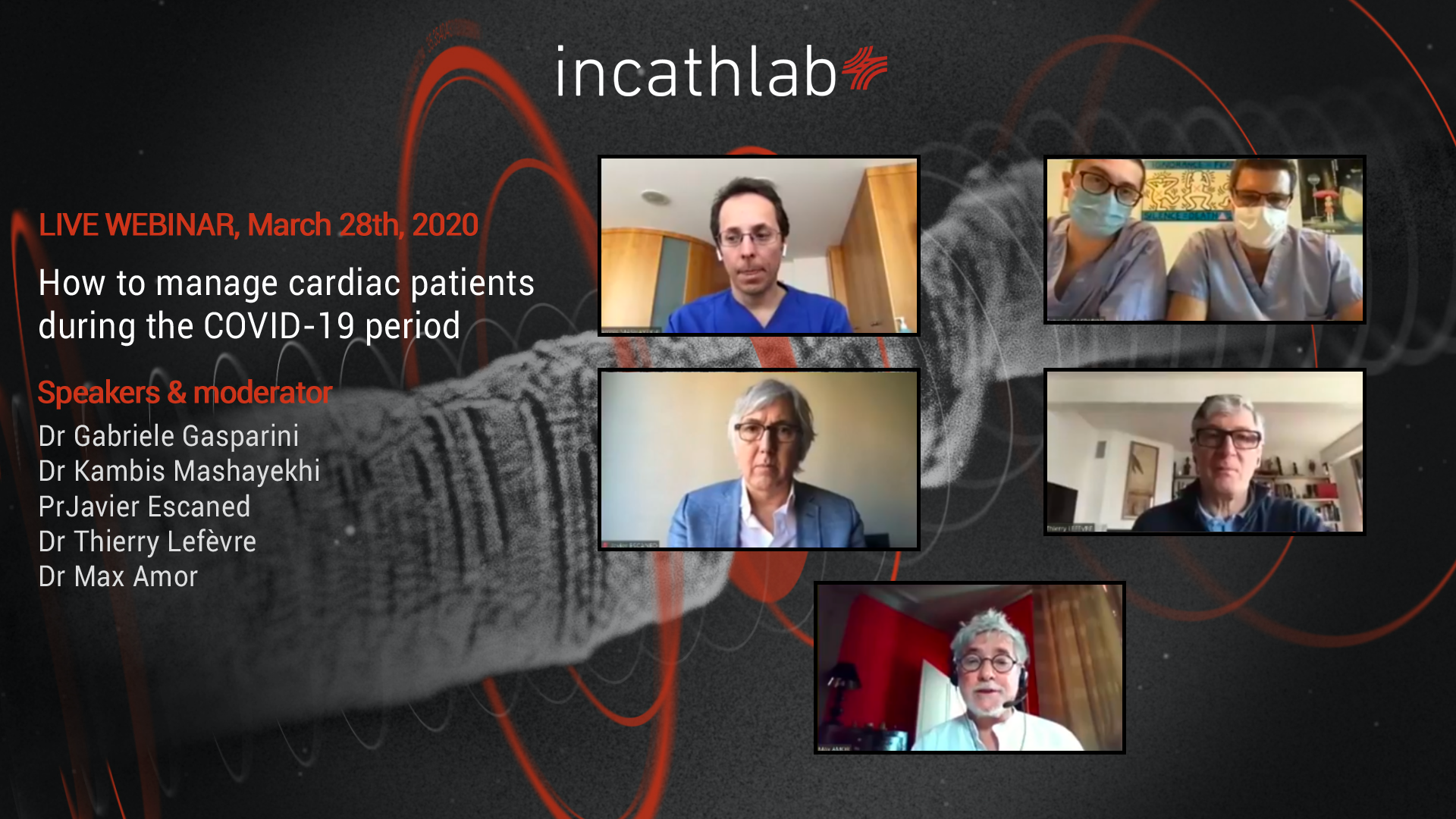
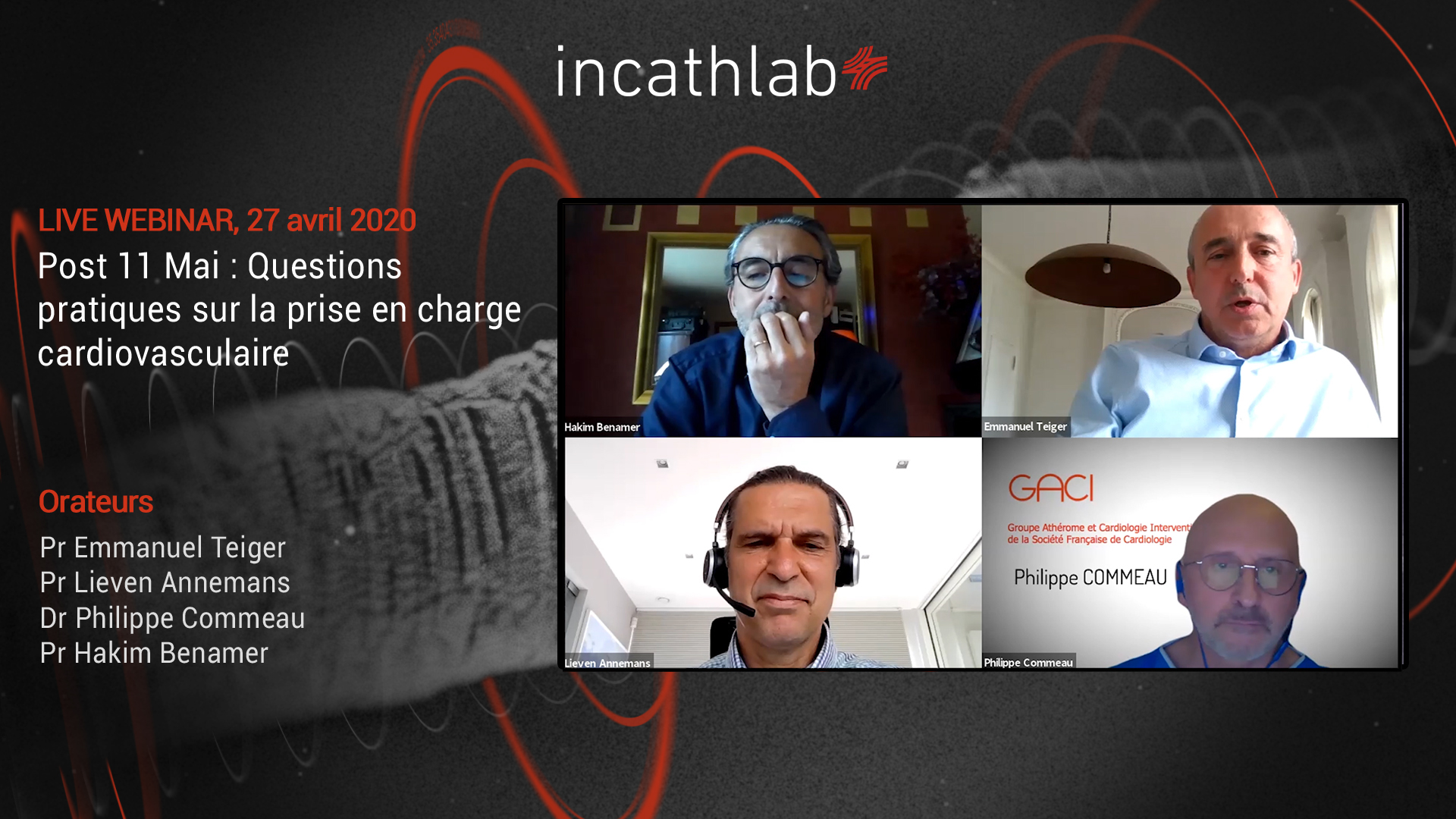
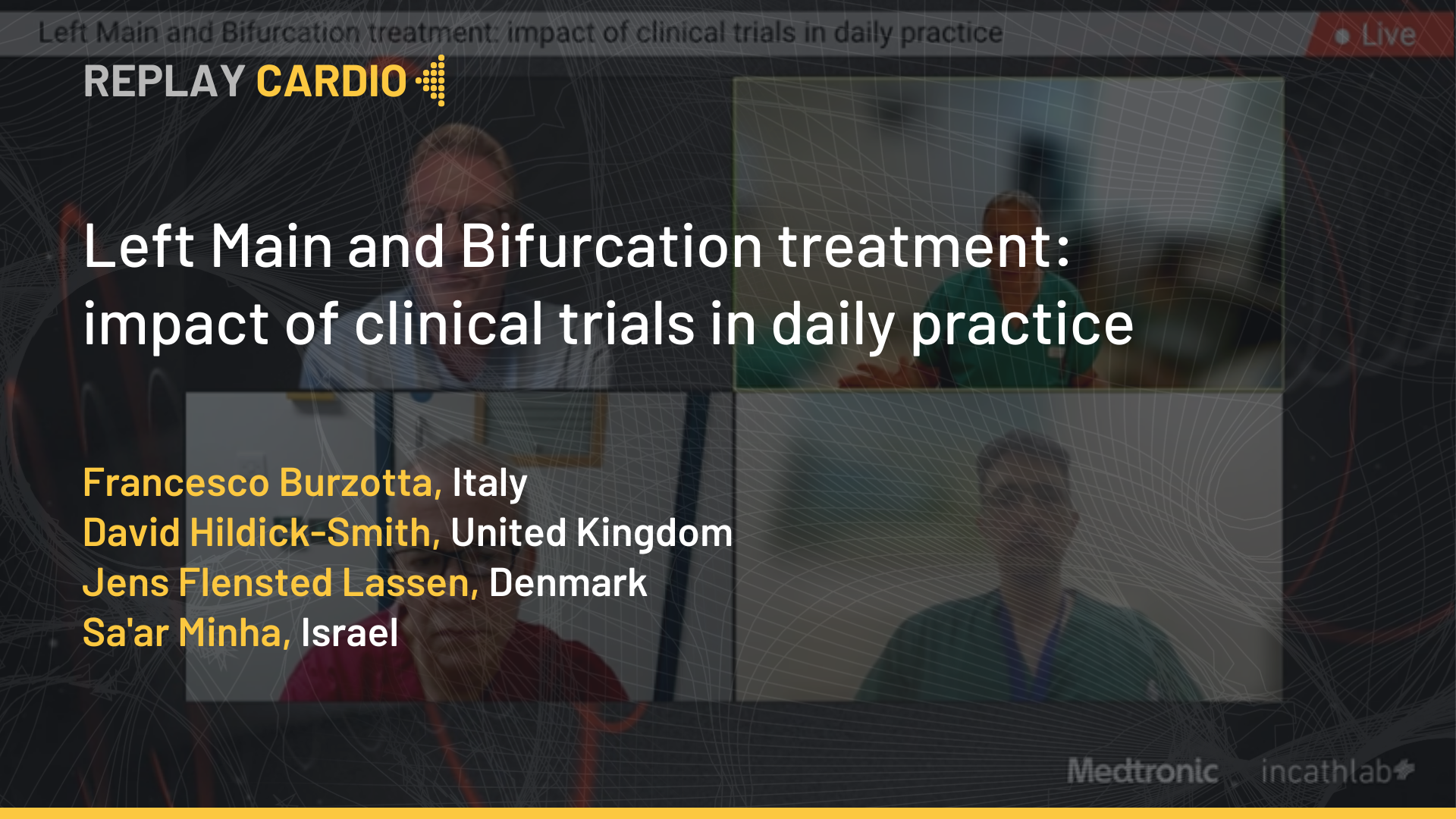
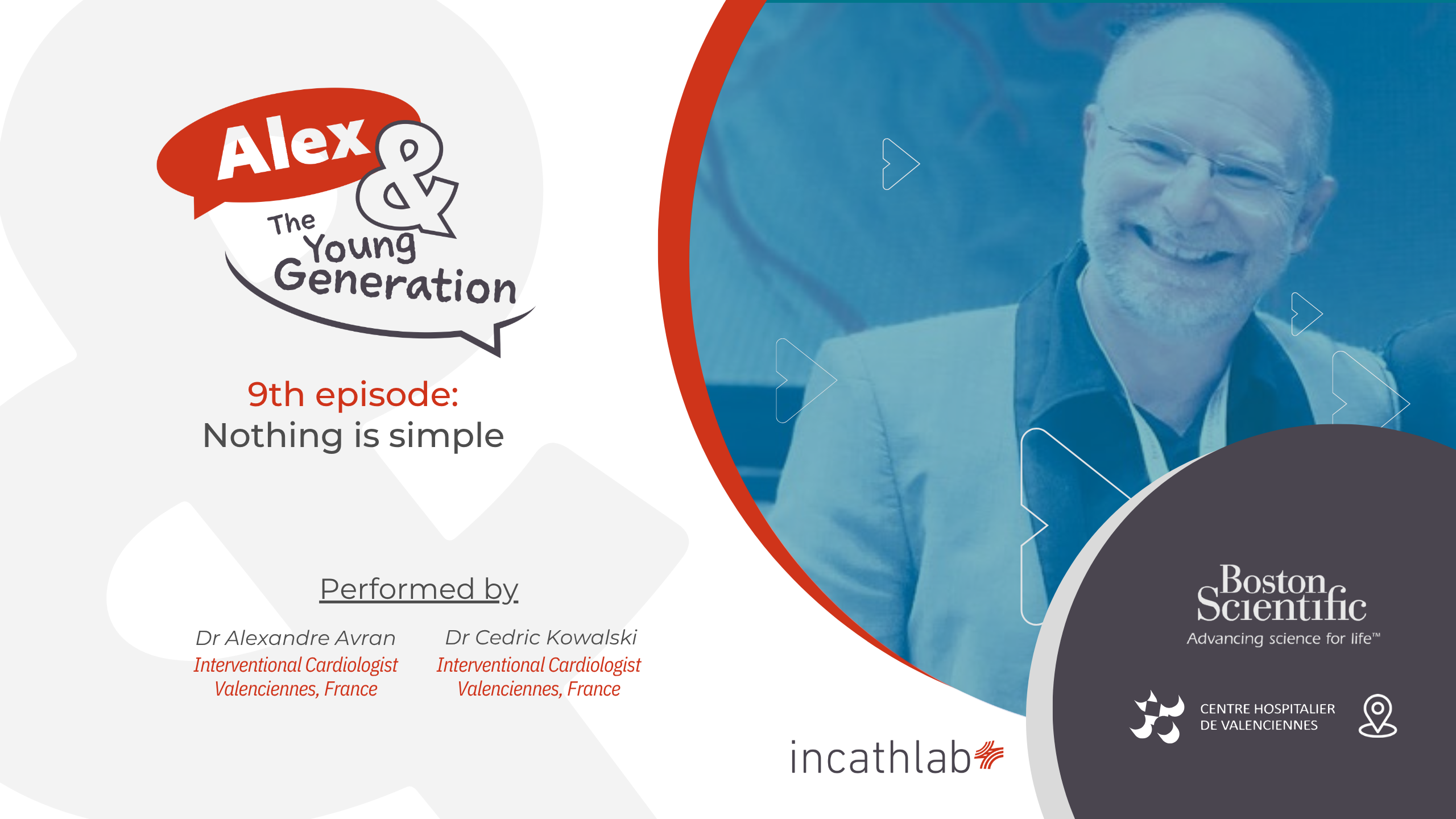
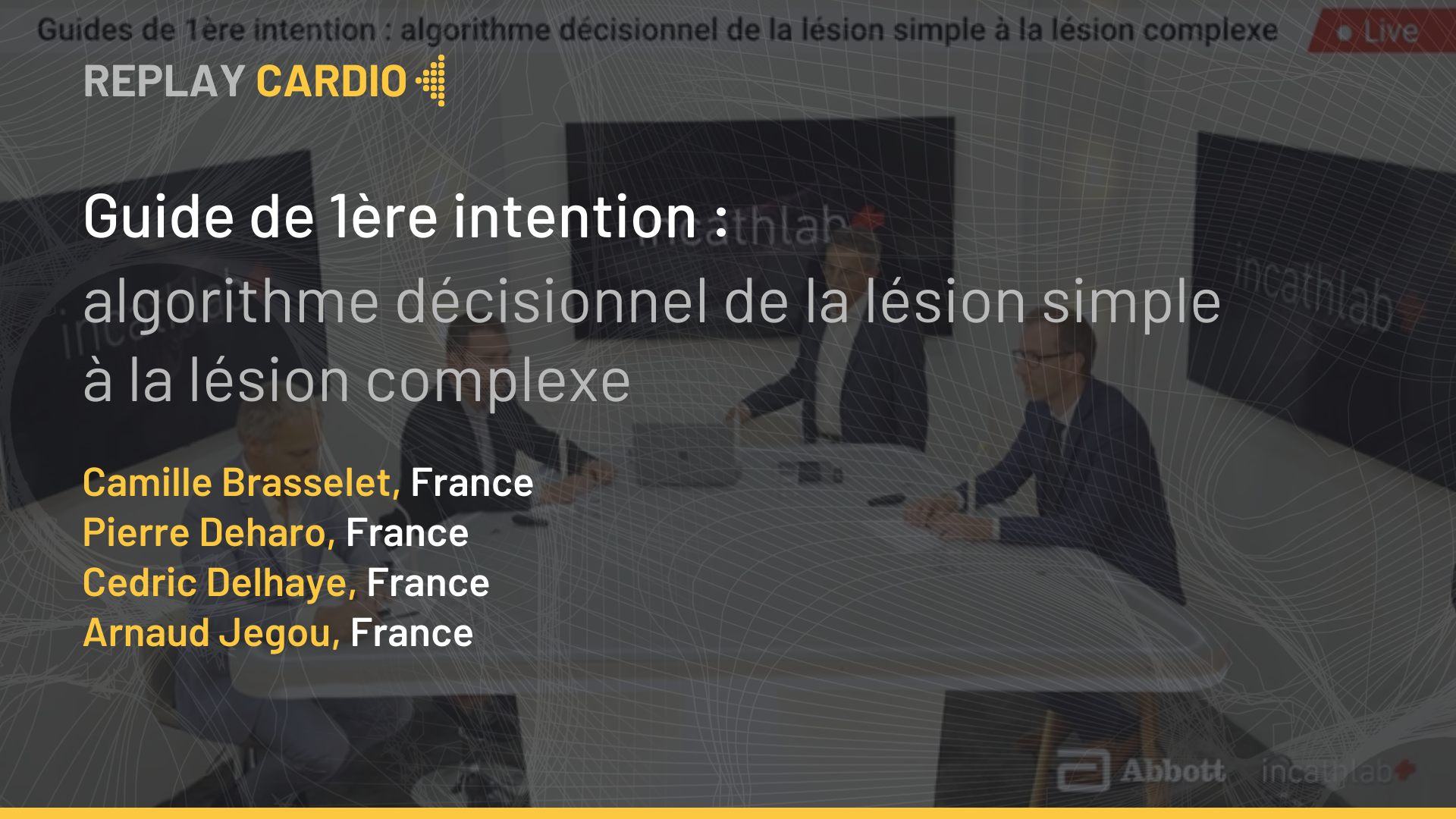
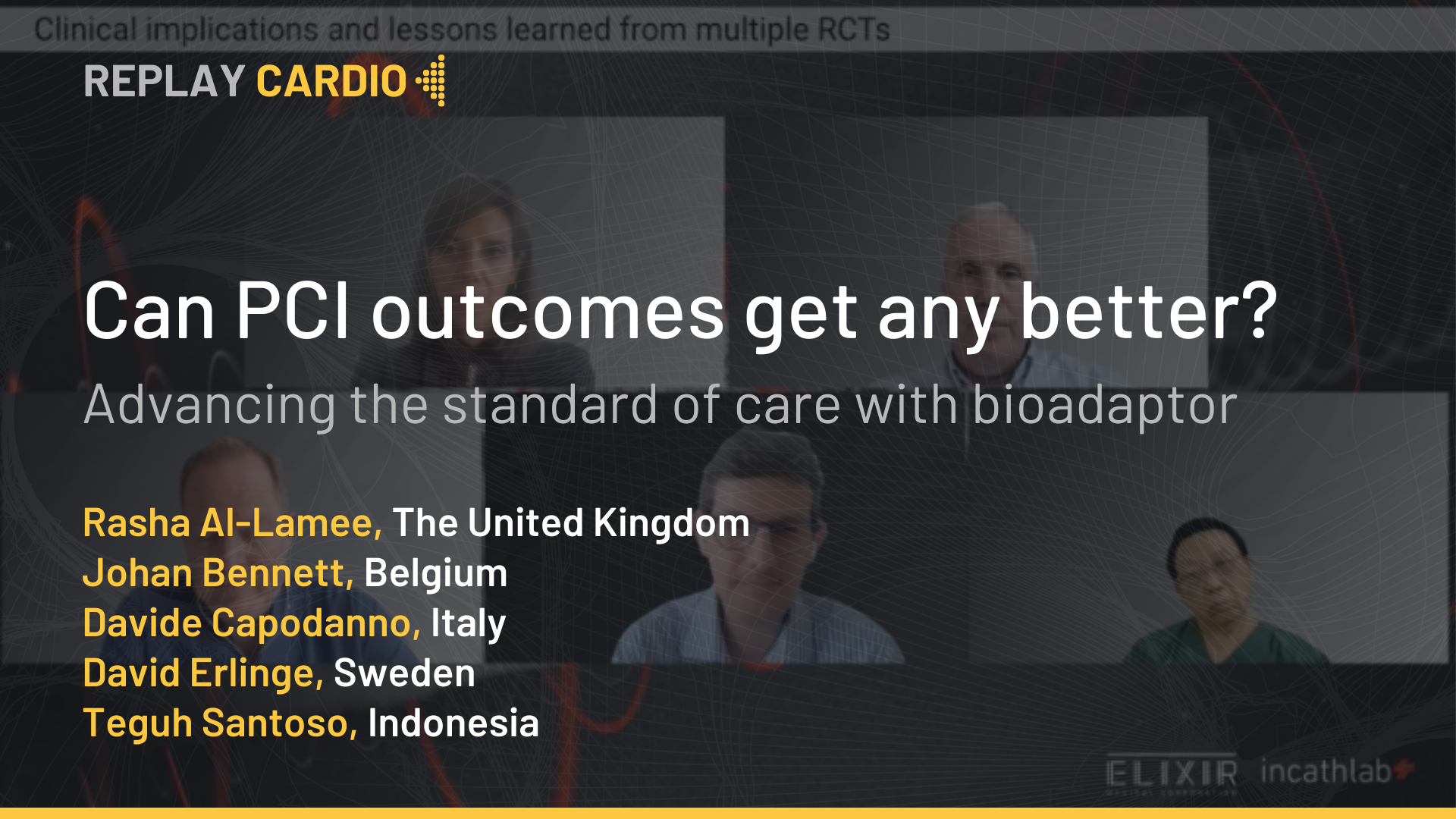
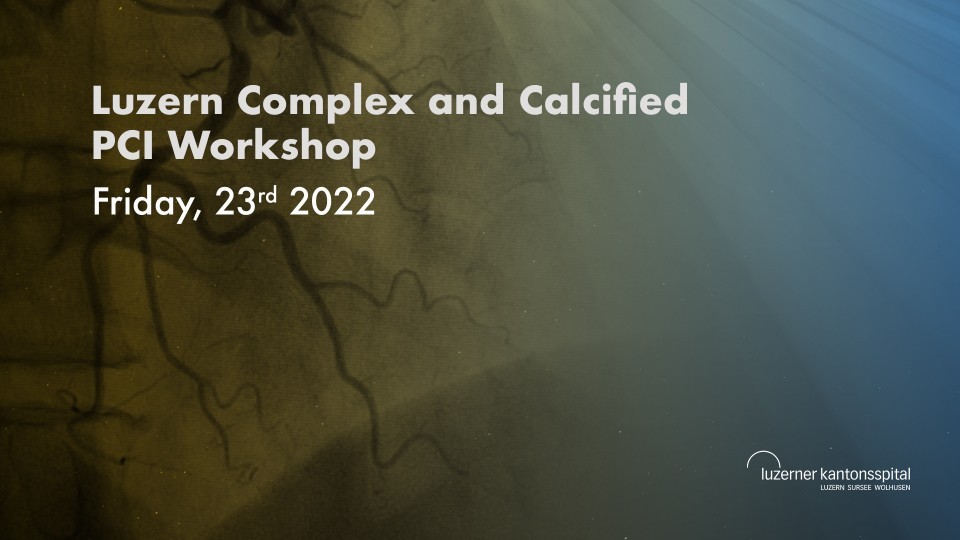
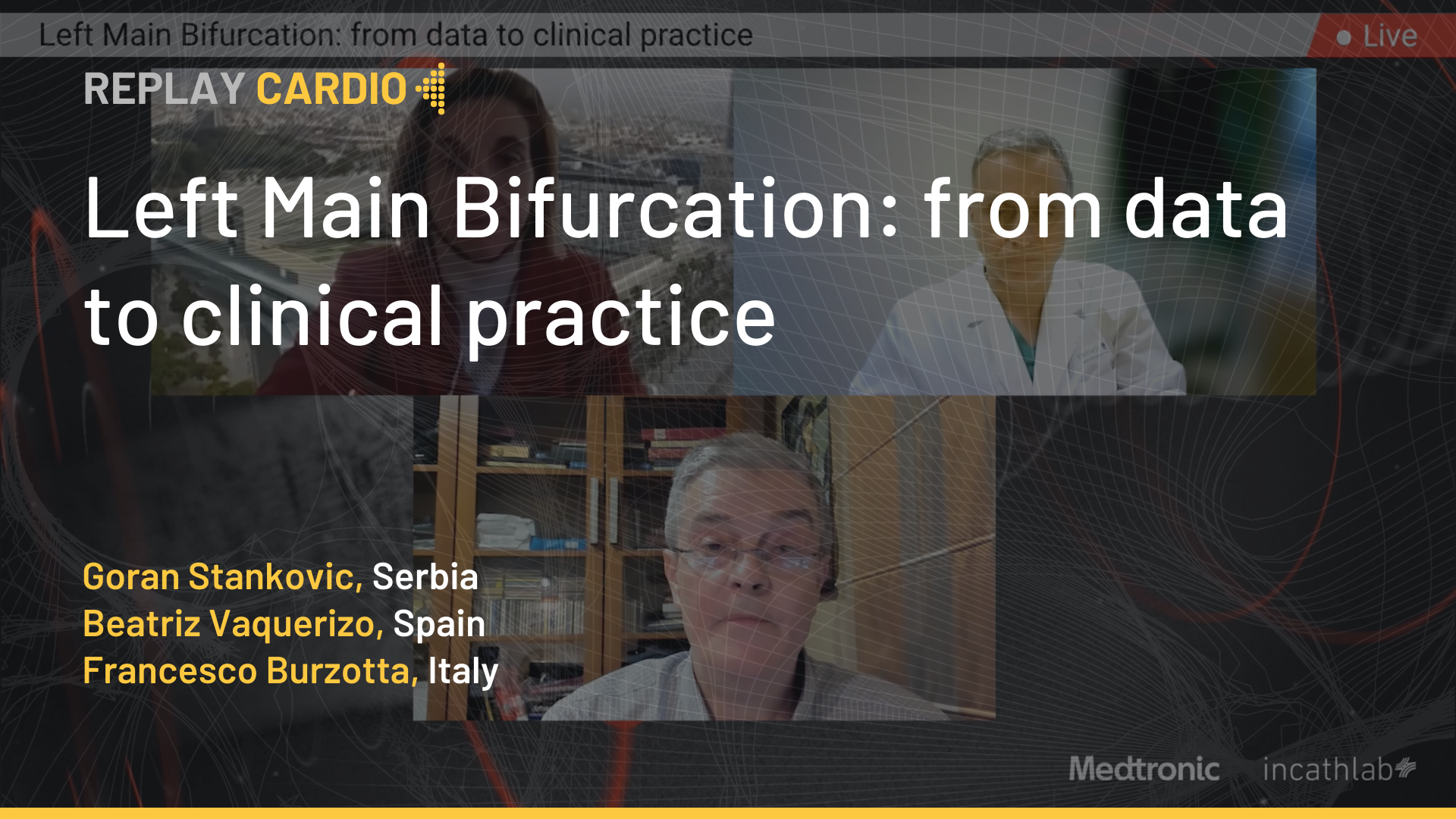
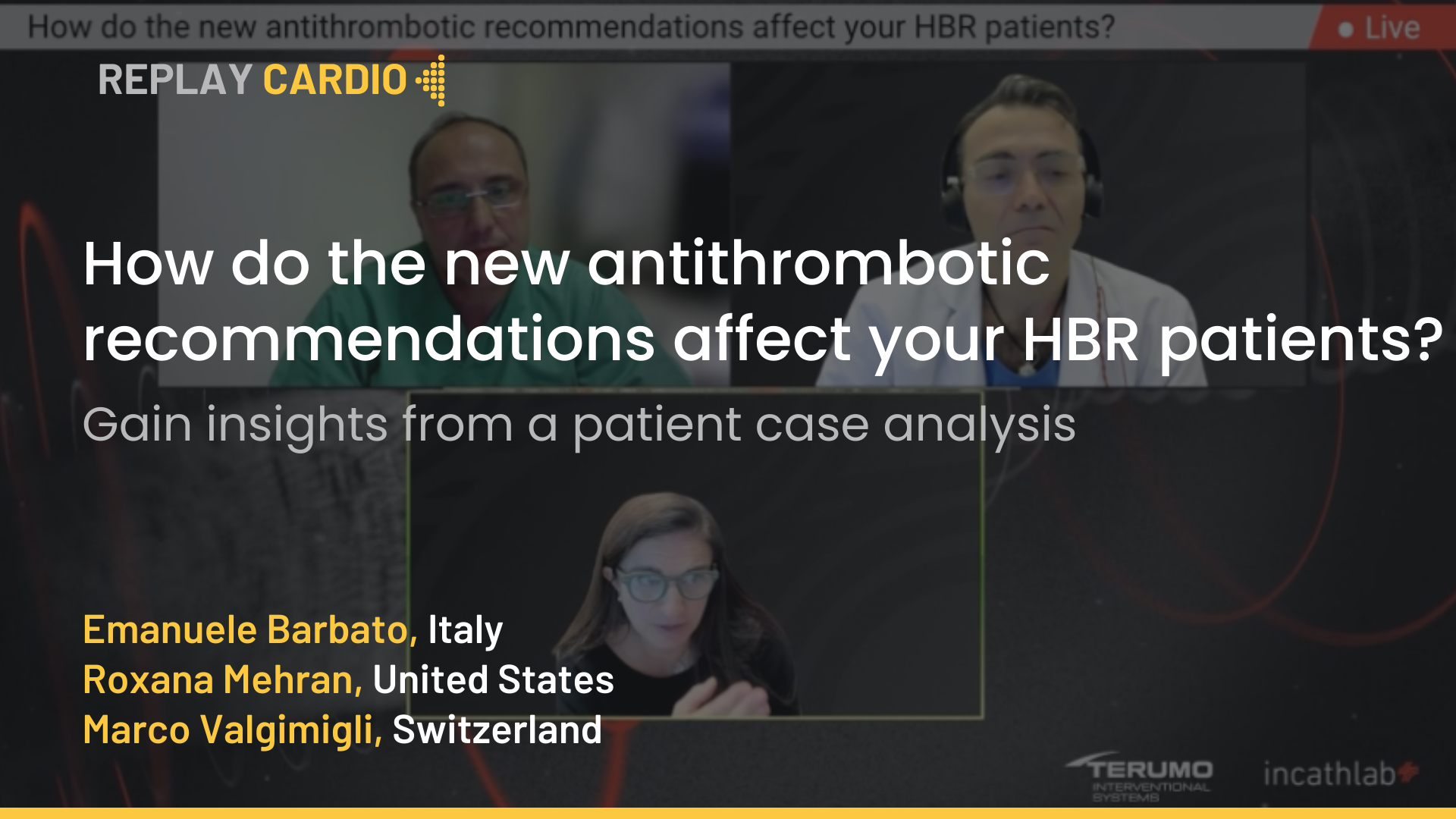
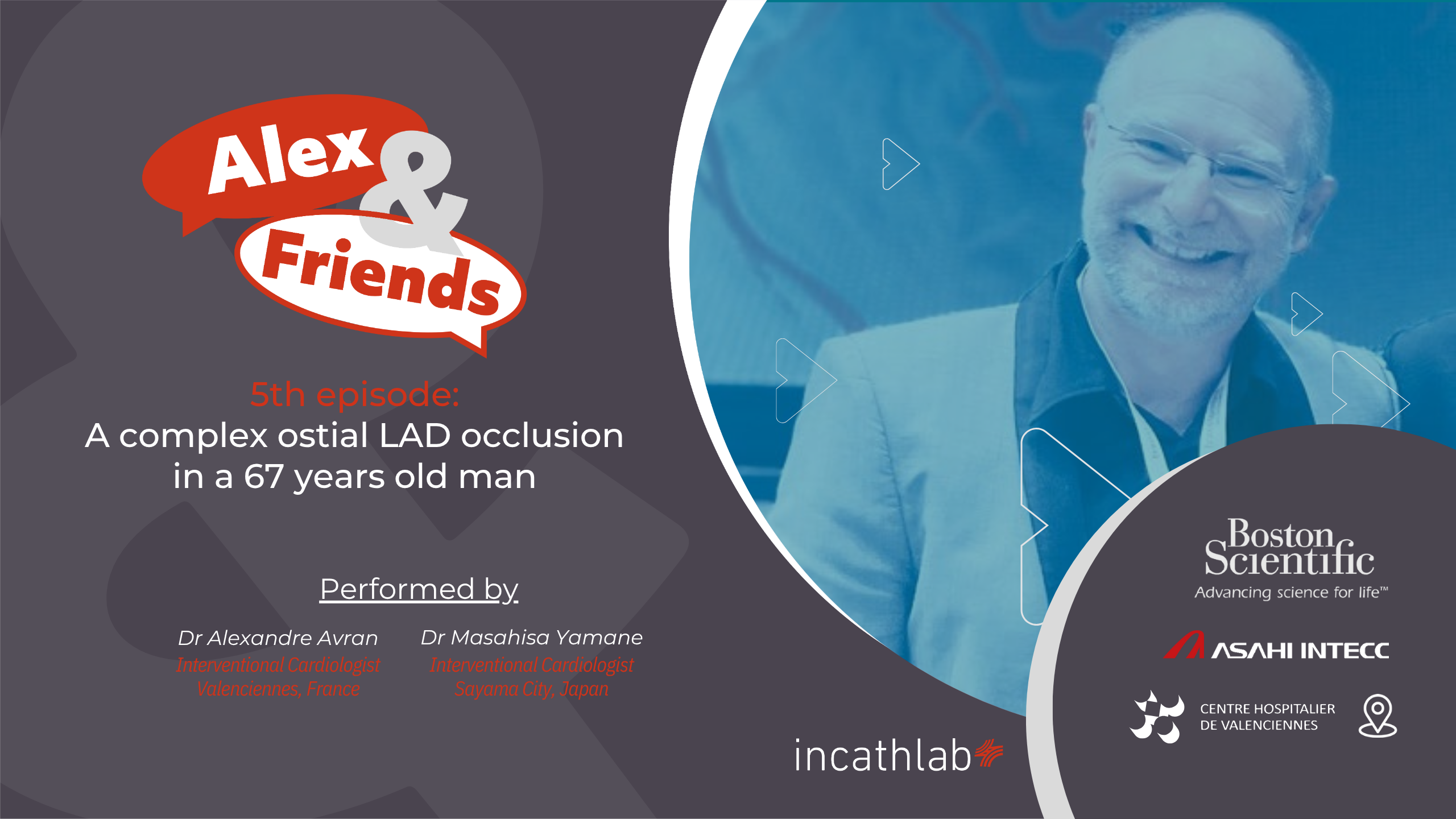
Georgios S. I think all emergency cardiac patients going to cath lab should be regarded as covid 19 positive due to high incubation period and for the safety of medical staff
Muzaffer Murat D. In order to evaluating CAD at the same time Are you doing Coronary CT while doing Thorax CT?
Benjamin F. Very interesting to learn that positive pressure in cathlabs is crucial!
Benjamin F. Crucial to STOP
Benjamin F. This week, we canceled 6 TAVI patients and did 2 urgent cases with clear stress of anesthesiologists to embolise ICU.
So more than never, cardiologist have to prefer Mini-invasive procedures in order to avoid complication and free asap hospitals beds: US guided punctures, Radial access and LV direct pacing...
Georgios S. Direct viral effect in myocardium appears not to be the case from pathology point of view
Georgios S. How to handle STEMI with cardiogenic shock
Antoine H. thank you
Matin G. A question regarding CPR in Cathlab.we have been recommended to use Lucas instead of manual for less exposure,. with lucas using radial access will not be feasible. Any experience with lucas ? since you were talking about advantsges of radial verdus femoral.